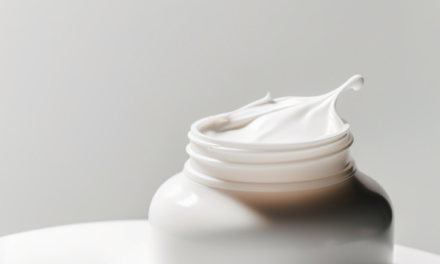What Does Sensitive Skin Mean and How to Help It?
Does your skin often feel irritated, red, itchy, or flaky without a clear reason? If so, you’re not alone. Sensitive or reactive skin can be a real headache to figure out. This guide will break down what we understand about sensitive skin, explore potential causes and triggers, and offer simple, but very effective steps that will help you reclaim your skin comfort.

Is my skin sensitive?
Sensitive skin is a term that you’ve probably heard thrown around often, but it might not mean what you think. Though it’s a popular term, it’s not actually a medically recognized skin type. You might be thinking, “Well, then, how do I know if I have sensitive skin?” Don’t worry, we’ve got you covered.
First, let’s make things clear: all skin is inherently sensitive. Your skin is like a vigilant guard, the first line of defense against external invaders such as pollutants and harmful substances. It’s always on the lookout, ready to react swiftly with inflammation to oust any threats before they can harm your body.
However, sometimes, this defense system can get a little too enthusiastic, reacting to harmless substances like certain cosmetic ingredients. People who often experience this sort of “overreaction” typically refer to their skin as sensitive. This doesn’t mean that their skin is always in this state, but certain triggers such as cosmetics or weather conditions can induce it.
You see, “sensitive skin” isn’t a permanent condition or skin type, but rather a temporary state. Think of it as your skin crying out that its protective barrier function has been compromised.
Some individuals are naturally more prone to disruptions in their skin barrier function, mostly due to genetic factors or skin conditions like eczema, psoriasis, rosacea, or even acne. Hormonal changes—like those during menstruation, pregnancy, menopause, or periods of stress—can also throw your skin barrier off-balance.
Now, when a skincare quiz or a salesperson at a beauty store asks, “Is your skin sensitive?” they’re really asking if your skin tends to react negatively to cosmetics or external triggers. Wondering how to answer?
Here are some signs that your answer should be “yes”:
- You can recall instances in the past 2-3 years where your skin became irritated, perhaps turning red, becoming excessively dry, or feeling itchy after using a product.
- Your skin often feels dry or tight, or you frequently experience unexplained redness from heat, cold, or seemingly out of nowhere.
- You struggle with skin conditions such as acne, eczema, rosacea, or psoriasis.
Remember, babies and young children’s skin is typically more reactive, so it’s usually considered “sensitive” by default.
According to studies, up to 70% of women and 60% of men report having some degree of sensitive skin.
In essence, all skin is sensitive; it’s just that some people’s skin is more reactive than others. If you don’t suffer from a chronic skin condition like eczema or psoriasis, “sensitive skin” is a temporary state resulting from a disrupted skin barrier. Once your skin barrier is restored, your skin’s hyper sensitivity should subside.
What causes hypersensitive or reactive skin?
Having sensitive, reactive, or hypersensitive skin might sometimes feel like a riddle. However, understanding it doesn’t have to be complicated. Essentially, sensitive skin is a sign of a weakened skin barrier function. When this protective layer is off-balance, your skin may struggle to shield itself against external “attackers”. This could result in symptoms such as dryness, tightness, itchiness, redness, or frequent inflamed acne breakouts.
Let’s break down the causes of sensitive skin into two categories: ‘external’ and ‘internal’ factors.
External factors
- Over-cleansing and over-exfoliating: This happens when you wash your skin too often or with a harsh cleanser. Using an overly strong exfoliating skincare product, or exfoliating too frequently can also lead to sensitive skin.
- Exposure to irritating ingredients: Certain elements in skincare, haircare, or household cleaning products can provoke sensitivity. These may include preservatives, fragrances (both natural and synthetic), plant extracts, and cleansing agents. Often, a mix of ingredients, rather than just one, can trigger irritation. Skincare actives like retinoids, vitamin C, AHAs, hydroquinone, benzoyl peroxide, and others, can also be strong irritants. Remember, the more products your skin encounters, the more likely it is to react.
- Exposure to allergens: While this may sound similar to exposure to irritating ingredients, it’s slightly different. Irritant reactions aren’t “permanent”—your skin might react to an ingredient once but be fine with it later. Allergic reactions, however, are more consistent. Once an allergic reaction occurs, every subsequent exposure to the allergen will trigger a reaction—even the smallest amount can cause trouble.
- Dry air environment: Places with heated or air-conditioned air, like homes or offices, can dry out your skin.
- Extreme weather conditions: Exposure to wind, cold temperatures, and direct sunlight can distress your skin.
Internal factors
-
Chronic skin conditions: Conditions like atopic dermatitis, psoriasis, rosacea, and others can make your skin more sensitive.
-
Medication and medical treatments: Certain medicines and treatments may lead to sensitive skin.
-
Allergens in food: Consuming food that you’re allergic to can also affect your skin’s sensitivity.
If you think your skin sensitivity might be due to internal causes, or if you’re experiencing an allergic skin reaction, it’s best to seek medical advice from a dermatologist.
How do sensitive skin reactions happen?
When your skin shows symptoms of sensitivity like redness, dryness or itching, it’s actually your immune cells going into a heightened state of alert. They sense danger in your environment, even if there isn’t any, and spring into action with inflammation to defend your body.
Now, sometimes this heightened response is due to an allergy. In such cases, your immune system permanently tags a substance as harmful. So, skin allergies, once they crop up, usually stick around for life.
However, more often than not, your immune system reacts to a threat just at that specific moment. This reaction is known as “irritant contact dermatitis” or simply, irritation. This means that your skin might react negatively to a skincare product today, but it could be completely fine with it a month from now. (Though, it’s important to note that we don’t recommend you try this out!).
Each of us has a unique level of tolerance to these perceived threats. Some people have highly tolerant skin, which can handle a variety of products and concentrated actives without any reaction. On the other hand, some people find that almost any skincare product can trigger sensitivity symptoms. The reason for this variance isn’t fully understood by doctors and scientists, though genetics definitely plays a part. In some cases, the skin’s immune system can be so sensitive that it leads to a chronic medical condition like eczema (also known as atopic dermatitis).
But even individuals with typically healthy skin can experience bouts of sensitivity. Certain substances, such as fragrances (both natural and synthetic) and preservatives, are more likely to cause irritation than others, especially when found in cosmetic products.
Irritant reactions are also more common when your skin barrier is weakened. Think of this barrier as a brick-and-mortar wall. The “bricks” are the dead skin cells on the surface, held together with the “mortar” of skin natural oils and water-loving substances. If there’s a “hole” in this wall, irritating substances can slip through more easily, setting off an alarm with the immune system.
Frequent or harsh cleansing is often the culprit behind a weakened skin barrier.
Three simple steps for helping sensitive skin restore the balance
Sensitive skin can be quite a handful. But fret not – here’s a simple three-step plan to help reduce your skin sensitivity and reclaim your comfort.
Step 1: Identify and eliminate triggers
First off, you need to become a detective for your own skin. Scan through everything that touches your skin, even the often-forgotten shampoo. The aim is to identify potential irritants and allergens. In practical terms, it often means taking a break from most of your current products for a while.
During this break, keep it simple – use a basic, non-irritating moisturizer, cleanser, and sunscreen. Once your skin starts to recover, reintroduce your products gradually, one at a time, while closely monitoring your skin’s reaction. If a flare-up occurs after reintroducing a product, you’ve likely found a culprit. This strategy, aptly called the “Product Elimination Diet“, was developed by Canadian dermatologist Dr. Sandy Skotnicki.
Step 2: Review your cleansing routine
The second step focuses on your cleansing routine. Gentle is the way to go. Use a mild cleanser and cleanse only when it’s absolutely necessary. For most people, a single cleanse at night is more than enough. When it comes to cleansing, less is often more.
Step 3: Embrace fragrance-free moisturizers
Lastly, use a good, fragrance-free moisturizer. This will provide essential hydration and help to rebuild your skin’s barrier, further reducing sensitivity. Keep the rest of your skincare free of fragrances and other potential irritants, too. You can do so conveniently using your personal ingredient Avoid List on WIMJ.
By following these three simple steps, you can significantly reduce skin sensitivity and enjoy the comfort of healthier skin.
Choose your products based on what's inside
WIMJ Search allows you to select skincare products based on ingredients, not marketing hype. Filter products by actives included, and exclude ingredients you don’t want. Check the concentration of ingredients and potential irritants.
Sources
- Contact Dermatitis to Personal Care Products is Increasing in Males and Females: North American Contact Dermatitis Group (NACDG) Data, 1996-2016 https://pubmed.ncbi.nlm.nih.gov/33039486/
- Irritant Contact Dermatitis https://onlinelibrary.wiley.com/doi/abs/10.1111/j.1440-0960.2007.00409.x
- Irritant contact dermatitis: A review https://onlinelibrary.wiley.com/doi/abs/10.1111/j.1440-0960.2007.00409.x
- The Prevalence of Sensitive Skinhttps://www.frontiersin.org/articles/10.3389/fmed.2019.00098/full
- Sensitive skin in Europe https://onlinelibrary.wiley.com/doi/abs/10.1111/j.1468-3083.2008.03037.x
- Textbook of Contact Dermatitis https://link.springer.com/book/10.1007/978-3-662-03104-9
Related Articles
Winter Skin Care: Navigating the Chilly Season with Healthy Skin
Let’s dive into understanding winter skin and how to best care for it.
The Dark Side of Lightweight Sunscreens
Do lightweight sunscreens provide enough sun protection? Lightweight sunscreen formulas have a higher risk of not providing the sun protection they promise. Learn more in this article.
Azelaic Acid: How It Works and Why You Might Need It In Your Skincare
Azelaic acid may not be the most hyped skincare ingredient, but, frankly speaking, it deserves way more recognition. Despite its underappreciated status, azelaic acid boasts a myriad of evidence-backed benefits, including combating acne, mitigating rosacea, addressing hyperpigmentation, and fighting against free radicals.
Why Has My Skin Become Sensitive All of a Sudden?
Have you recently noticed your skin turning into a battleground of reactions? Is your once-placid complexion now flaring up at your go-to beauty products? You’re not alone. Suddenly sensitive skin can perplex anyone. Here’s a breakdown of why it might be happening and what you can do about it.
Sunflower Seed Oil: The Top Face Oil For Skin Barrier
Struggling to decide which face oil to choose? Sunflower seed oil might not be the most glamorous or exotic of skincare oils, but it could actually be the best for your skin.
CBD Skincare Benefits and Unknowns
Discover the impressive potential of CBD in skincare and learn about the risks. Our evidence-based exploration covers the CBD potential for treating acne, eczema, psoriasis and combating inflammation.
Is Petrolatum In Skincare Bad?
Get the facts about petrolatum, a top ingredient in skincare. Learn how this powerful moisturizer soothes, protects, and hydrates the skin. Plus, discover why it’s trending on social media and how it’s safe even for the most sensitive skin areas.
Can You Use Retinoids for Rosacea-Prone Skin?
If you’ve been grappling with the frustrating skin condition called rosacea, you may have been advised to steer clear of retinoids. This advice typically stems from concerns that retinoids can further irritate your already inflamed skin. But here’s something that may surprise you: retinoids, in fact, are commonly used in rosacea medical treatments.
Sensitive & Reactive Skin: What to Avoid?
If you have sensitive or reactive skin, what not to do is at least as important as what you actively undertake in terms of skincare. Learn what ingredients and skincare practices to avoid to reduce your skin sensitivity issues and help heal your skin barrier.
Opting for Fragrance-Free Skincare: A Skin-Friendly Choice
Opting for Fragrance-Free Skincare: A Skin-Friendly ChoiceIs the smell of your skincare products hurting your skin? It's a question we often don't think about. Yes, the scents can be nice, but they can also cause problems. About one in three skin issues from cosmetics...




